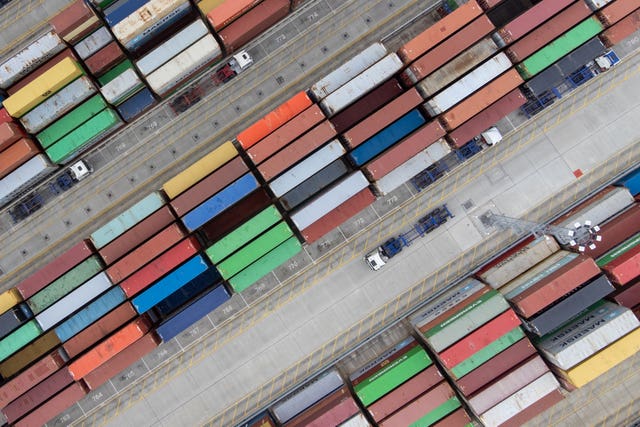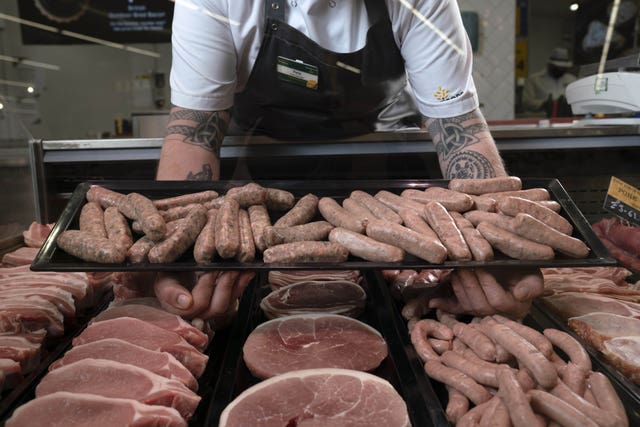
The Transport Secretary Grant Shapps has said “Christmas will go ahead” after further measures were introduced in a bid to tackle supply chain problems hitting industries across the UK.
Shoppers are said to be buying a raft of Christmas items, such as presents and frozen turkeys, early in a bid to make sure their festive celebrations are not heavily disrupted for a second year.
– What is causing all these problems?
The UK economy has been disrupted by several factors that have been bubbling away for months, including labour shortages, new immigration rules affecting HGV drivers and the lingering effects of the pandemic.
There is estimated to be a shortfall of around 100,000 lorry drivers, and soaring energy costs have also added to the cost of food production and logistics.
The HGV driver shortage has had numerous knock-on effects and has caused a backlog at UK ports such as Felixstowe. Shipping containers were not able to be emptied and removed from the port quick enough for new deliveries to be deposited.
Globally, the pandemic is complicating international supply chain logistics, affecting grocery and toy imports.

Heavily reduced flights schedules have decreased capacity for air cargo, placing significant pressure on international ports.
Meanwhile, pandemic restrictions in east Asia have also forced some key ports to close in the region, holding up items such as clothes and furniture made in the region.
– Surely we can sort this out by Christmas?
It’s all getting a little close for comfort. Staff shortages are causing major problems in sectors ranging from turkey factories to hotels, pubs and restaurants. Hospitality bosses fear they will be unable to cope over the festive period.
Meanwhile, retailers have warned that global supply chain disruption due to the pandemic and the shortage of lorry drivers is likely to affect Christmas supermarket shelves and toy deliveries.
Christmas trees could be affected too as problems importing from the EU places a squeeze on those grown locally.
– Isn’t panic-buying making the problem worse?
UK consumers have been told that panic-buying – whether of toilet rolls, fuel or cranberry sauce – is not the answer, and there is enough to go around if everyone shops normally.
However, Tesco, Sainsbury’s, M&S, Co-op, Aldi and Asda have all begun selling Christmas puddings, chocolate treats and more, with some stores even imploring customers to buy now to avoid possible shortages closer to the big day.
Some toy retailers, such as Gliddons Toy Shop in Sidmouth, Devon, have also called on shoppers to “buy now” to avoid Christmas disappointment.
Toy retailer The Entertainer has also urged shoppers to get organised, warning that it has been unable to use the full quantity of shipping containers to import stock.
The Entertainer founder Gary Grant said: “If you know what you want to buy your child, don’t be chasing round the country in December.
“I would genuinely recommend putting things away early.”
– What can be done to solve the problems?
Speaking last month, Boris Johnson said the Government will “make sure we have the preparations necessary to get through to Christmas and beyond”.
So far these measures to help ease disruption over the festive period have included issuing 5,000 temporary visas to foreign lorry drivers to alleviate shortages and 5,500 EU visas for poultry workers.
The UK’s largest poultry firm 2 Sisters Food group said it has been able to take on around 700 new workers as a result to help put turkeys on the shelves.
Questions still remain as to how quickly visas will be taken up by prospective workers and whether this will be soon enough to alleviate disruption.
Additionally, this week the Government announced an extra 800 visas for foreign butchers amid concerns of a backlog of pigs due for slaughter, which could have impacted products such as pigs in blankets.

On Thursday, the Department for Transport (DfT) lifted the limit on the number of deliveries foreign lorry drivers can make in the UK for up to six months.
Currently, hauliers from the EU can only make up to two trips to drop off or pick up goods between locations in the UK within one week.
Retailers are also taking matters into their own hands, with the likes of John Lewis chartering a fleet of extra ships, alongside a number of other businesses, as part of plans to tackle supply chain woes in time for Christmas.
– Will this make Christmas more expensive?
Retailers have admitted that rising energy bills, delays in shipping and higher wages aimed at addressing staff shortages have contributed to a particularly costly time for business.
The British Retail Consortium (BRC) told PA that three-fifths of retailers are planning to increase prices by the end of the year as a result.
It added that around 10% of retail bosses said they have already hiked prices to offset these soaring costs.
Meanwhile, poultry firms said the price of produce is set to surge by 10%, meaning this year’s Christmas dinner could be the most expensive yet.


Comments: Our rules
We want our comments to be a lively and valuable part of our community - a place where readers can debate and engage with the most important local issues. The ability to comment on our stories is a privilege, not a right, however, and that privilege may be withdrawn if it is abused or misused.
Please report any comments that break our rules.
Read the rules hereLast Updated:
Report this comment Cancel